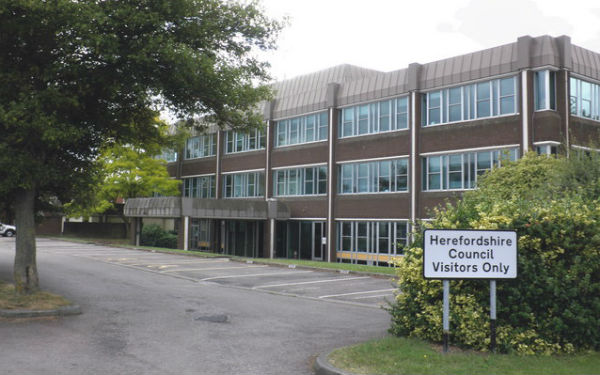
A local authority has walked away with a ‘requires improvement’ judgment under Ofsted’s new inspection framework, despite its leadership being found ‘inadequate’.
In its assessment, Ofsted said that senior managers at Herefordshire council had “not been effective in overseeing and ensuring that social work practice flourishes”.
“Their lack of grip and direction has resulted in a service where some decision-making is very poor,” the report added. “Some staff do not receive supervision and workforce capacity is not at the level required to provide a good-quality service for children and families.”
‘Excessive’ caseloads
Off the back of that lack of capacity, caseloads had risen to an “excessive” level, Ofsted said. Staff were not being effectively deployed, nor were they receiving “robust, clear [or] timely” oversight, and some felt a “strong disconnect” from managers.
In mitigation, inspectors noted that the authority, which was taken to task by a judge for ” wrongly and abusively” making children subject to section 20 accommodation and has been installing new senior managers, had faced a tough time.
“The council has made a recent significant financial investment to support the development and improvement of children’s social care services,” they said. “The director of children’s services is aware of the need to take robust and immediate measures to strengthen his management team and there is very recent evidence of assertive action.”
Nonetheless, they concluded that “too many children in need of help and protection and children in care are receiving a poor service”.
‘Tenacious and responsive’ workers
Despite the pressure of their workloads, some social workers at Herefordshire garnered praise from Ofsted for their “tenacious and responsive” approach. Child protection and looked-after children’s services were both graded ‘requires improvement’.
Inspectors noted that the councils’ multi-agency safeguarding hub (MASH) supported strong decision-making, with most contacts being swiftly processed.
Early help services delivered an “intense package” of assistance to families, while child protection investigations were carried in a timely fashion, with initial conferences convened promptly.
“Fewer children are the subject of repeated referrals to children’s social care and fewer children are subject to repeat child protection plans,” the inspection report said. “This means that, for some children, intervention is effective and their improved outcomes are sustained.”
‘Targeted and effective action’
In the wake of Herefordshire’s criticism in court, it was recommended the council review all cases where children had been made subject of section 20 arrangements.
“As a result,” Ofsted said, “a targeted and effective action plan has led to more recent assertive decision-making and the progression of plans for some children”.
Inspectors found a number of other positive elements within Herefordshire’s services for looked-after children and care leavers.
“Children are actively encouraged to attend their reviews, and advocacy is used appropriately,” they said.
“Child-centred letters are written to children by independent reviewing officers (IROs), informing them of outcomes and decisions of their reviews, and this helps children understand what is happening,” the report added.
Inspectors also noted that “skilled work” was carried out with unaccompanied asylum-seeking children.
Uneven picture
Both within child protection and looked-after children’s services, however, Ofsted observed many knock-on effects from poor leadership.
Besides caseloads being high, they were also mixed, meaning social workers struggled to prioritise competing demands, resulting in inconsistent quality of service.
This unevenness carried through to assessments. “In poorer assessments, and particularly where neglect is a longstanding issue, social workers do not routinely consider historic concerns and their analysis can be over-optimistic,” inspectors said.
The quality of frontline practice correlated with this picture, with Ofsted finding that it was only sporadically evident.
“Social workers do not receive regular supervision, and when it does take place, it does not provide the necessary support and direction to ensure that all children’s cases progress without delay,” Ofsted said.
‘No risk of immediate harm’
Responding to the Ofsted report, Elissa Swinglehurst, Herefordshire’s cabinet member for young people and children’s wellbeing, said it was important to note that no children were found to be at risk of immediate harm.
Praising the commitment of staff noted by the regulator, Swinglehurst added: “Our highest priority at Herefordshire is to protect children and give them the best start in life. We still have a way to go to meet our goal of being rated as a good service; however, I’m confident we are taking the necessary steps to achieve this in future.”
Chris Baird, the council’s director for children’s wellbeing, said: “We are pleased Ofsted found that we know ourselves well, that we had recognised areas of strength and been clear with the inspection team on the weaknesses that they would find.”
He added: “We have a new leadership team determined to build on the strengths that benefit children and young people in Herefordshire, and put right the areas of weakness that have been identified in the report.”


 Family help: one local authority’s experience of the model
Family help: one local authority’s experience of the model  ‘I spent the first three months listening’: how supportive leadership can transform children’s services
‘I spent the first three months listening’: how supportive leadership can transform children’s services  How senior leaders in one authority maintain a culture of excellence
How senior leaders in one authority maintain a culture of excellence  How staff support ensures fantastic outcomes for children and families
How staff support ensures fantastic outcomes for children and families  Workforce Insights – showcasing a selection of the sector’s top recruiters
Workforce Insights – showcasing a selection of the sector’s top recruiters 

 Facebook
Facebook X
X LinkedIn
LinkedIn Instagram
Instagram
Comments are closed.